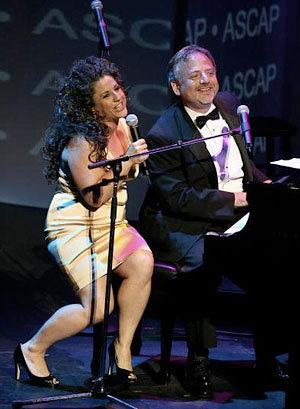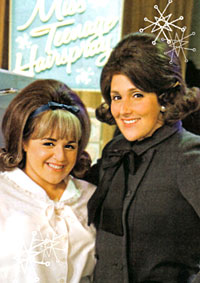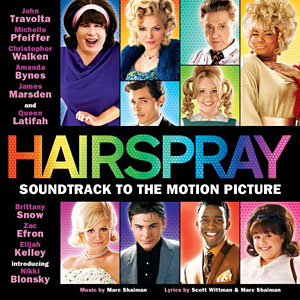

  |
|
|
||||||||||||||||||||||
|
FMS FEATURE... July 11, 2007 "You Can't Stop The Beat" Shaiman's unrivaled songwriting talent is outed by Hairspray colleagues by Jon Burlingame  Marissa Jaret Winokur with Marc Shaiman "I've never worked with anyone who is as passionate about what they do. He loves what he does, he loves writing it, singing it – he loves to perform – and he could probably do it better than all of us. And he'll let you know that," she says with a laugh. Winokur won one of the eight 2003 Tony Awards that went to Shaiman's Broadway smash Hairspray, which makes the transition to the big screen this month. Even though she's not in the movie, she – along with Ricki Lake, the original Tracy Turnblad in the John Waters cult classic from which the musical was adapted; and Nikki Blonsky, who plays Tracy in the new movie – showed up at the Capitol recording studio in early May to record a number for the Hairspray soundtrack, under Shaiman's supervision.  Nikki Blonsky and Ricki Lake A few weeks later, Shaiman is at the newly reopened Stage M on the Paramount lot, supervising the recording of the orchestral underscore for the film. Donning headphones, he leans on the podium and listens carefully while conductor Pete Anthony rehearses 60 of Hollywood's top musicians in cue 1M6, "Talk to Her, Wilbur." It's a delicate piece, mostly for piano and strings, running just over a minute and based on Hairspray's familiar opening number, "Good Morning, Baltimore." After the rehearsal and a first recording, Shaiman decides to make a few technical adjustments: "Basses, at bar 14, I wonder if that could be pizzicato. It sounds too rich. Cellos, just a little breath between bars 3 and 4." The musicians dutifully pencil in the notes on their parts. The composer sips a Diet Dr. Pepper as director Adam Shankman arrives in time for another recording of the cue. Soon everyone is satisfied, and the orchestra moves on to the next piece. Shaiman – a Tony and Grammy winner (for Hairspray), an Emmy winner (for one of his hilarious Oscar-night song medleys for Billy Crystal) and a five-time Oscar nominee – is beloved by the musicians. They applaud him at the start of the session, and during a break he chats with many who have played for him since his first dramatic score for Misery 17 years ago. He may be best-known for his comedic scores, including the wild Western sendup City Slickers, the rich and dance-filled Addams Family films and the delightfully retro '60s sound of Down With Love. But his dramatic scores, notably the dark and martial A Few Good Men and the majestic, frequently imitated but never surpassed theme for The American President, are equally valued among film-music cognoscenti. Shaiman's songs, from the delightful "A Wink and a Smile" from Sleepless in Seattle to the satirical "Blame Canada" from South Park: Bigger, Longer & Uncut, are among his most fun contributions to contemporary film music. (Robin Williams – who sang the latter on the 2005 Oscars – recently recalled that Shaiman's number about cartoon characters' addictions was cut at the last minute from that show: "We had that controversial song about the cartoons that was banned. It was pretty wonderful. Marc's obviously got the musical chops, but it's his ability to write pretty wonderful lyrics at the drop of a hat which is amazing. Whenever I see Marc I have pianist envy.") Shankman, the choreographer turned director (Bringing Down the House, The Pacifier), is irreverent around both Shaiman and the orchestra. But he turns serious for a moment to talk about his composer friend, who he has known for nearly 20 years. "I have yet to find something that Marc can't do. I personally feel that 'Can't Stop the Beat' is the best closing number of any show ever. People hear that song and it's like they've just drunk 10 Red Bulls, they're so happy. They're on the verge of explosion." Asked where that sensibility originates, Shankman says: "It comes from an entire life of being a fan, and listening to so much music – and having respect for so many other people's work that he doesn't need to reinvent the wheel. He just reinterprets it. He conceives song through character and story and then puts his personal sense of humor on it."  ©2007 Jon Burlingame |
Search
Past Features
Feature Archives
|